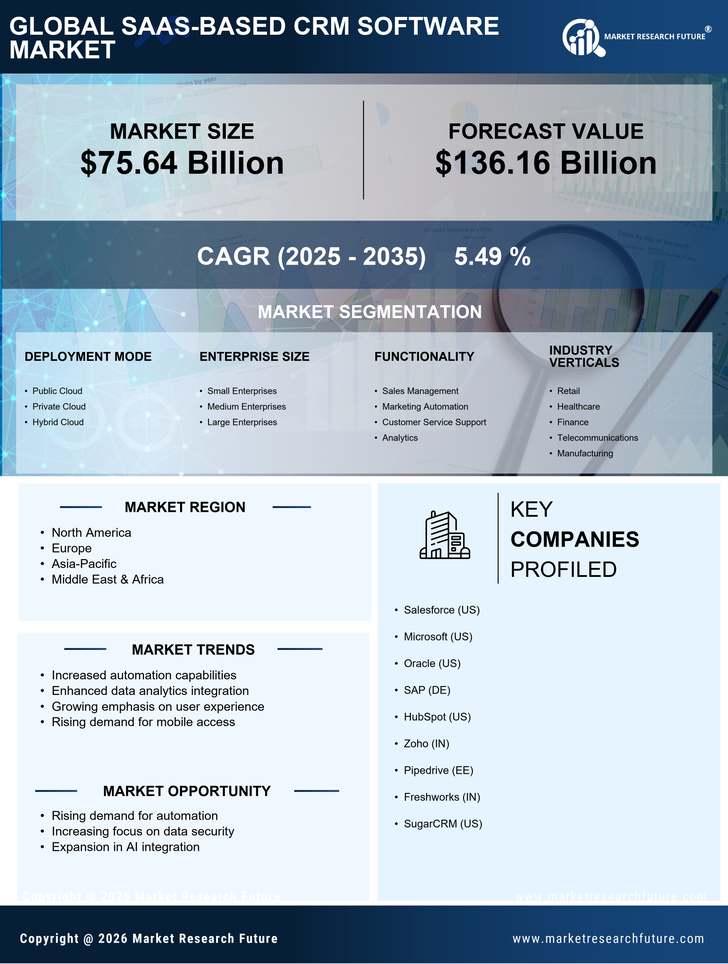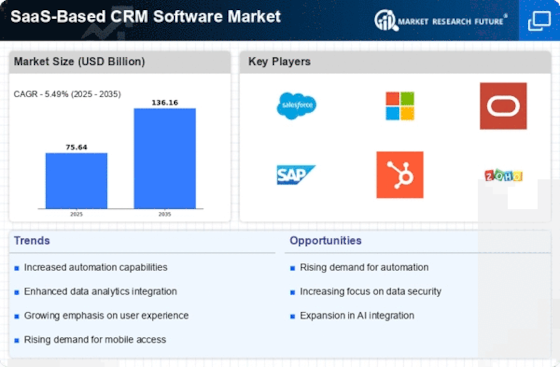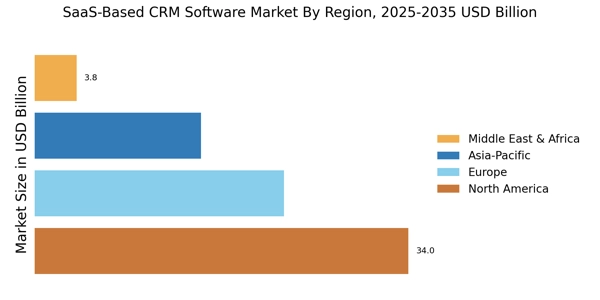Rising Demand for Remote Work Solutions
The SaaS-Based CRM Software Market is experiencing a notable surge in demand for solutions that facilitate remote work. As organizations increasingly adopt flexible work arrangements, the need for cloud-based CRM systems that enable seamless collaboration and communication among distributed teams becomes paramount. This shift is reflected in the market data, which indicates that the SaaS CRM segment is projected to grow at a compound annual growth rate (CAGR) of approximately 14% over the next five years. Companies are seeking CRM solutions that not only support remote access but also integrate with other tools to enhance productivity. This trend suggests that the SaaS-Based CRM Software Market is well-positioned to cater to the evolving needs of businesses aiming to maintain operational efficiency in a remote work environment.
Growing Adoption of Mobile CRM Solutions
The growing adoption of mobile CRM solutions is a significant driver within the SaaS-Based CRM Software Market. As mobile technology continues to advance, businesses are increasingly leveraging mobile CRM applications to enhance their sales and customer service capabilities. Market data indicates that mobile CRM usage is expected to rise, with a projected increase of over 30% in the next few years. This trend reflects the need for sales teams to access customer information and manage relationships on-the-go, thereby improving responsiveness and efficiency. Consequently, the SaaS-Based CRM Software Market is likely to see a proliferation of mobile-friendly features and functionalities, catering to the demands of a mobile workforce.
Increased Focus on Data Security and Compliance
The SaaS-Based CRM Software Market is witnessing an increased focus on data security and compliance as organizations prioritize the protection of sensitive customer information. With the rise of data breaches and stringent regulations, businesses are seeking CRM solutions that offer robust security features and compliance with industry standards. Market data reveals that companies investing in secure CRM systems are likely to enhance their reputation and build trust with customers. This trend underscores the importance of integrating advanced security measures, such as encryption and multi-factor authentication, into CRM platforms. As a result, the SaaS-Based CRM Software Market is evolving to address these concerns, ensuring that organizations can operate confidently in a landscape where data security is paramount.
Emphasis on Customer Experience and Personalization
In the SaaS-Based CRM Software Market, there is a growing emphasis on enhancing customer experience through personalization. Businesses are increasingly aware that tailored interactions can significantly impact customer satisfaction and loyalty. As a result, CRM solutions that offer customizable features and personalized communication strategies are in high demand. Market data suggests that companies utilizing personalized CRM strategies can achieve up to a 20% increase in customer retention rates. This trend indicates that the SaaS-Based CRM Software Market is adapting to meet the expectations of consumers who seek more relevant and engaging interactions with brands. The focus on customer experience is likely to drive innovation in CRM functionalities, further shaping the competitive landscape.
Integration of Advanced Analytics and Reporting Tools
The integration of advanced analytics and reporting tools within the SaaS-Based CRM Software Market is becoming increasingly critical. Organizations are recognizing the value of data-driven decision-making, prompting a demand for CRM systems that offer robust analytical capabilities. Market data indicates that CRM solutions with integrated analytics are likely to see a significant uptick in adoption, as businesses strive to gain insights into customer behavior and sales performance. This trend not only enhances the functionality of CRM systems but also empowers organizations to tailor their marketing strategies effectively. Consequently, the SaaS-Based CRM Software Market is evolving to incorporate sophisticated analytics features, which may lead to improved customer engagement and retention.


















